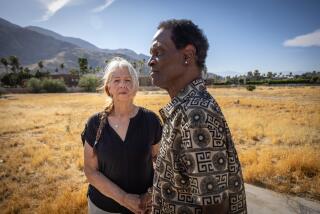On View : American Flyer
Jackie Robinson and Jesse Owens may be regarded as the athletes who broke ground for African-Americans, but before them came cyclist Marshal W. (Major) Taylor, who is considered to be the first black U.S. athlete to be widely recognized.
At the turn of the century, when cycling was the major sport in America, Taylor was a world champion and record holder. His fame, accolades and riches were much like those of today’s athletes.
Yet even before he died in 1932, Taylor was just a footnote in sports history. His death received little notice as cycling was unfamiliar to a new generation that had already moved on to different sports and athletes.
But Taylor is remembered again with a four-hour miniseries, “Tracks of Glory,” starring Phil Morris.
“I have a lot of passion toward Major Taylor,” Morris said. “He was the kind of figure who kicked doors down.”
Morris, best known for his regular roles on ABC’s 1988-1990 “Mission: Impossible” revival and CBS’ “WIOU” during the 1990-91 season, Morris sees “Tracks of Glory,” as an easy-to-grasp history lesson for children.
“Kids are very tuned in to sports and identify with athletes,” Morris said. “For a figure like Major Taylor to be recognized is important. It’s important to know that people who came before today’s sports superstars had a tough time, and those frustrations are age-old.”
Taylor was far removed from many of today’s cocky, arrogant athletes.
“He was connected to the Lord,” Morris said of Taylor, who refused to race or even discuss business on Sundays. “He had humanity. If he was a jerk, (his enemies) would have slit his throat.”
Taylor was born in Indianapolis in 1878. He was nicknamed Major as a youngster while performing bicycle stunts while wearing a military uniform.
He became a professional cyclist in 1896, and within two years had broken records in every short distance race. In 1899, he won the world mile sprint championship.
“Tracks of Glory” looks at Taylor’s career in 1903 and 1904, when he raced in Australia.
Not only did he dominate the Australian circuit, Taylor was warmly received in a nation that only a year before had enacted the “White Australia Policy,” barring the immigration of non-whites.
During his time there, flamboyant promoter Hugh D. McIntosh (played by Richard Roxburgh) imported two other Americans, Iver Lawson (Rodney Bell) and Floyd MacFarland (Nicholas Edie), to race against Taylor. In a move reminiscent of modern day pro wrestling, the rules were soon ignored and the sport degenerated into a violent sideshow matching heroes and villains.
“Tracks of Glory” concludes with an historically accurate “Rocky-esque” ending. But not covered in the movie are the difficult years that followed, when Taylor faced health troubles, financial problems and prejudice.
After Austrailia, the real Taylor headed home to Worcester, Mass., accompanied by Walker. When he arrived in San Francisco, he encountered prejudice.
“We found it impossible to dine in the restaurants because the management drew the color line, and the same condition confronted us at the hotels,” Taylor wrote in his 1928 autobiography, “The Fastest Bicycle Rider in the World,” subtitled “The Story of a Colored Boy’s Indomitable Courage and Success Against Great Odds.”
He said the “genuine hatred and bitter prejudice” that MacFarland, who was from San Jose, displayed toward him “reflected the attitude of the people of California whom I encountered.”
When Taylor returned to Worcester, he suffered a collapse, which he wrote was caused by his strenuous campaign in Australia. He was later suspended by the National Cycle Assn. for failing to fulfill a European contract, and was sued for breach of contract.
A settlement was reached that forced Taylor to break his pledge to never ride on Sundays. In 1908, he returned to racing in Europe, setting two world records that would last for 20 years.
Taylor retired from racing in 1910. Taylor was then rejected for admission to Worcester Polytechnic Institute because he lacked a high school diploma, a limitation his daughter felt was not waived because he was black.
In 1930, his wife Daisy Taylor separated from her husband, leaving Worcester for New York City. Taylor moved to Chicago, often going door-to-door to sell his autobiography to retired cyclists and those who had been in the cycling industry during his heyday.
Taylor fell ill in March, 1932, and died in the charity ward of Chicago’s Cook County hospital. Taylor’s body laid unclaimed in the hospital’s morgue. He was buried in the welfare section of the Mount Glenwood Cemetery in an unmarked grave.
Although Taylor’s death received scant attention, he was not totally forgotten. In 1948, Frank Schwinn, owner of the Schwinn Bicycle Company agreed to pay for exhumation and the transfer of Taylor’s remains to the cemetery’s Memorial Garden of the Good Shepherd. Taylor was also honored by Indianapolis in 1982, when a new cycling track was named in his memory.
Tracks of Glory airs Saturday and next Sunday on KCAL at 9 p.m. and on KUSI at 8 p.m.
More to Read
Go beyond the scoreboard
Get the latest on L.A.'s teams in the daily Sports Report newsletter.
You may occasionally receive promotional content from the Los Angeles Times.










